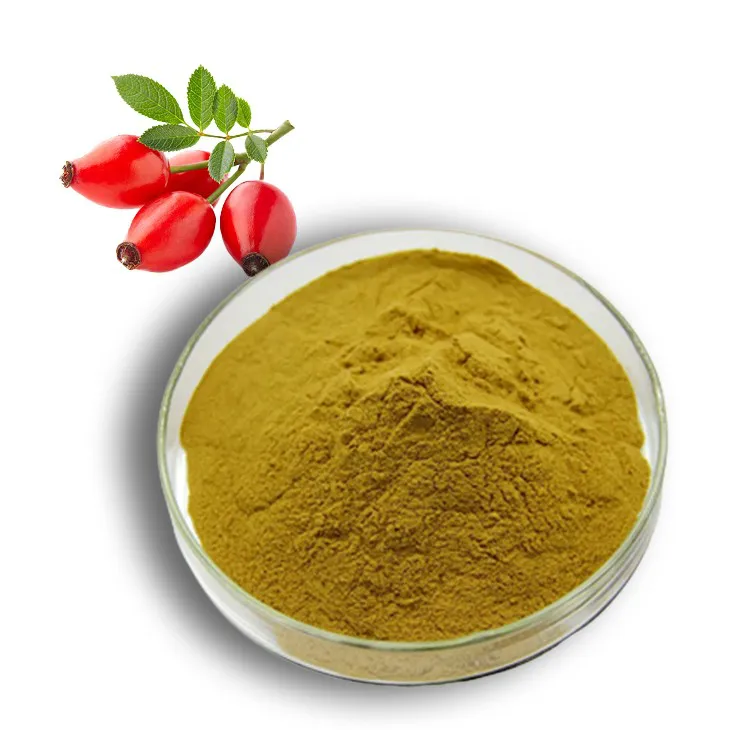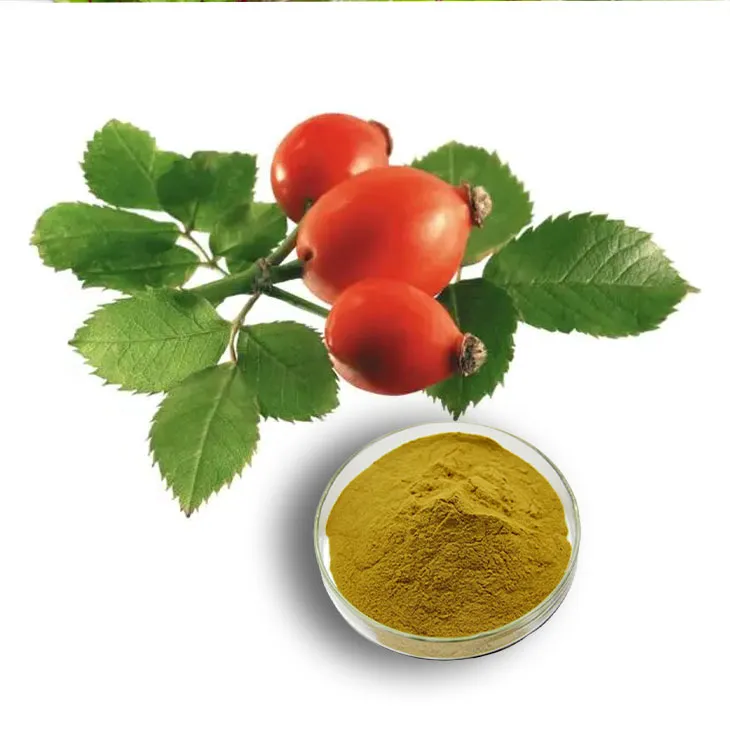- 0086-571-85302990
- sales@greenskybio.com
Organic Non - Genetically Modified Rose Hip Extract.
2024-11-30

Introduction to Organic Non - Genetically Modified Rose Hip Extract
The organic non - transgenic rosehip extract has been garnering significant attention in recent times. This is due to the numerous benefits it offers. Rosehips, which are the fruit of roses, are truly a natural treasure trove of nutrients. The "organic" label is not just a marketing term; it actually ensures that the rosehips are grown in an environmentally friendly and sustainable way, without any form of genetic modification. This is of great importance to consumers who are increasingly conscious about the origin and production methods of the products they use.

Nutritional Composition of Rose Hip Extract
One of the main reasons for the popularity of the organic non - transgenic rosehip extract is its rich nutritional profile.
Vitamins
It is a significant source of vitamins A, C, and E.
- Vitamin A: This vitamin is essential for good vision and plays a crucial role in maintaining healthy skin. It helps in the growth and repair of body tissues, including the skin and mucous membranes.
- Vitamin C: Widely known for its ability to boost the immune system, vitamin C also has powerful antioxidant capabilities. It helps in fighting off infections and diseases by strengthening the body's natural defenses. Additionally, it is involved in the synthesis of collagen, which is important for healthy skin, bones, and joints.
- Vitamin E: This vitamin is vital for protecting cells from oxidative damage. Oxidative stress can lead to various health problems, including premature aging, cancer, and heart disease. Vitamin E helps in neutralizing free radicals, which are the main cause of oxidative damage.
Minerals
The extract also contains important minerals like calcium and magnesium.
- Calcium: It is vital for bone health. Calcium is the main building block of bones and teeth, and it also plays a role in muscle function, nerve transmission, and blood clotting.
- Magnesium: This mineral is involved in over 300 biochemical reactions in the body. It is important for maintaining normal muscle and nerve function, a healthy immune system, and strong bones. It also helps in regulating blood sugar levels and blood pressure.

Uses in Wellness
In the realm of wellness, the organic non - transgenic rosehip extract has a wide range of applications.
Digestive Aid
One of the potential benefits is its role as a natural remedy for digestion. This is mainly due to its fiber content. Fiber helps in promoting regular bowel movements, preventing constipation, and improving overall digestive health. It can also help in reducing the risk of developing certain digestive disorders, such as diverticulosis and colon cancer.

Applications in the Cosmetic World
In the cosmetic world, the organic non - transgenic rosehip extract is highly valued.
Skin Brightening
It has the ability to brighten the skin. This is achieved through its various nutrients, such as vitamin C, which helps in reducing the appearance of dark spots and hyperpigmentation. By promoting collagen synthesis, it also gives the skin a more youthful and radiant appearance.
Scar Fading
Another important use is in fading scars. The extract contains compounds that can help in reducing the redness and inflammation associated with scars. It also promotes the regeneration of skin cells, which can gradually fade the appearance of scars over time.
Complexion Improvement
Overall, it can improve complexion. By providing essential nutrients to the skin, it helps in maintaining a healthy skin barrier. This results in a smoother, more even - toned complexion, with reduced dryness, flakiness, and roughness.
Suitability for Sensitive Skin
The organic non - transgenic nature of the rosehip extract makes it particularly suitable for those with sensitive skin or allergies. Since it is free from genetic modification and is organically grown, it is less likely to cause irritation or allergic reactions compared to some synthetic or chemically - treated ingredients.
Potential in the Pharmaceutical Industry
The organic non - transgenic rosehip extract is also being explored in the pharmaceutical industry.
Anti - Inflammatory Properties
It shows potential for having anti - inflammatory properties. Inflammation is a key factor in many diseases, such as arthritis, heart disease, and cancer. By reducing inflammation, the extract may have a role in the prevention and treatment of these diseases.
Antioxidant Properties
Its antioxidant properties are also of great interest. As mentioned earlier, antioxidants help in protecting cells from oxidative damage. In the pharmaceutical context, this could potentially be used in the development of drugs for various conditions related to oxidative stress, such as neurodegenerative diseases and age - related macular degeneration.
Conclusion
In conclusion, the organic non - genetically modified rosehip extract is a remarkable ingredient with a diverse range of benefits. Its rich nutritional composition, along with its various applications in wellness, cosmetics, and potential in the pharmaceutical industry, make it a highly valuable substance. As research continues, it is likely that more uses and benefits of this extract will be discovered, further highlighting its importance in various fields.
FAQ:
What are the main nutrients in organic non - genetically modified Rose Hip Extract?
Organic non - genetically modified rose hip extract is rich in vitamins A, C, and E. It also contains minerals such as calcium and magnesium.
What are the benefits of organic non - genetically modified rose hip extract for skin?
It can brighten the skin, fade scars, and improve complexion. Also, due to its organic non - transgenic nature, it is suitable for those with sensitive skin or allergies.
How can organic non - genetically modified rose hip extract help with digestion?
It may aid in digestion because of its fiber content.
Why is the organic label important for rose hip extract?
The organic label ensures that the rose hips are cultivated in an environmentally friendly and sustainable manner without any genetic modification.
What potential does organic non - genetically modified rose hip extract have in the pharmaceutical industry?
It is being explored in the pharmaceutical industry for its potential in developing new drugs with anti - inflammatory and antioxidant properties.
Related literature
- The Nutritional and Therapeutic Potential of Rose Hip Extract"
- "Organic Rose Hip Extract: Cultivation and Health Benefits"
- "Non - Genetically Modified Rose Hip Extract in Cosmetics and Pharmaceuticals"
- ▶ Hesperidin
- ▶ citrus bioflavonoids
- ▶ plant extract
- ▶ lycopene
- ▶ Diosmin
- ▶ Grape seed extract
- ▶ Sea buckthorn Juice Powder
- ▶ Beetroot powder
- ▶ Hops Extract
- ▶ Artichoke Extract
- ▶ Reishi mushroom extract
- ▶ Astaxanthin
- ▶ Green Tea Extract
- ▶ Curcumin Extract
- ▶ Horse Chestnut Extract
- ▶ Other Problems
- ▶ Boswellia Serrata Extract
- ▶ Resveratrol Extract
- ▶ Marigold Extract
- ▶ Grape Leaf Extract
- ▶ blog3
- ▶ blog4
-
The best baicalin in nature.
2024-11-30
-
Chinese lily extract manufacturers.
2024-11-30
-
Nature's best β - carotene.
2024-11-30
-
Standard - process Coenzyme Q10.
2024-11-30
-
Bulk purchase of pomegranate extract.
2024-11-30
-
Extraction process of bilberry extract.
2024-11-30
-
Acai Berry Extract
2024-11-30
-
Lemon Juice Powder
2024-11-30
-
Red Date Extract
2024-11-30
-
Red Wine Extract
2024-11-30
-
Black Rice Extract
2024-11-30
-
Aminolevulinic acid
2024-11-30
-
Chasteberry Extract
2024-11-30
-
Panax Ginseng Leaf Extract
2024-11-30
-
Cranberry Extract
2024-11-30
-
Kidney Bean Extract
2024-11-30





















